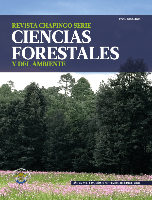
Revista Chapingo Serie Ciencias Forestales y del Ambiente
Scope & Guideline
Fostering collaboration in the pursuit of ecological excellence.
Introduction
Aims and Scopes
- Forest Ecology and Management:
Research on the ecological dynamics of forest ecosystems, including studies on tree diversity, biomass accumulation, and the effects of management practices on forest health. - Conservation and Biodiversity:
Focus on conservation strategies for various forest types, including the assessment and management of biodiversity in forested areas, particularly in relation to climate change and habitat restoration. - Ecosystem Services Valuation:
Investigations into the economic value of ecosystem services provided by forests, including carbon storage, water quality, and recreational benefits, providing essential data for policy-making. - Technological Applications in Forestry:
Utilization of advanced technologies such as unmanned aerial vehicles (UAVs) and remote sensing for monitoring forest conditions, assessing biomass, and supporting sustainable forest management. - Climate Change Impacts:
Studies addressing the effects of climate change on forest ecosystems and species distribution, focusing on adaptive management strategies to mitigate adverse effects. - Restoration Ecology:
Research on restoration techniques for degraded forest areas, including seed transfer zones and reforestation efforts, particularly in sensitive ecological regions.
Trending and Emerging
- Climate Change Adaptation Strategies:
Research on adaptive strategies for forests in the context of climate change is increasingly prominent, emphasizing the need to understand how forest ecosystems can adjust to changing environmental conditions. - Technological Innovations in Forestry:
The use of UAVs and remote sensing technologies for forest monitoring and management is rapidly growing, showcasing advancements in data collection and analysis that enhance sustainable practices. - Ecosystem Services and Socioeconomic Links:
There is a rising focus on the interconnection between ecosystem services and socioeconomic factors, particularly how forest management impacts local economies and community well-being. - Restoration and Reforestation Initiatives:
Studies on restoration practices, including seed transfer zones and grafting techniques, are becoming more common, reflecting a growing commitment to rehabilitating degraded ecosystems. - Biodiversity and Conservation Genetics:
Research exploring the genetic diversity of forest species and its implications for conservation is on the rise, indicating an increasing awareness of the importance of genetic health in ecosystem resilience.
Declining or Waning
- Traditional Timber Production Studies:
Research specifically focused on traditional timber production methods has decreased as the journal shifts towards more integrated studies involving ecosystem services and sustainability. - Invasive Species Management:
There has been a noticeable reduction in studies centered solely around invasive species management, indicating a broader focus on ecosystem interactions rather than isolated species threats. - Historical Forestry Practices:
Papers detailing historical forestry practices have become less common, suggesting a move towards contemporary issues and modern forest management techniques. - Local Community Impacts of Forestry:
Research examining the direct impacts of forestry practices on local communities has declined, as the journal increasingly emphasizes broader ecological and economic perspectives. - Single-Species Studies:
Investigations focusing exclusively on single species without considering their ecological context are less frequent, reflecting a trend towards more holistic ecological studies.
Similar Journals
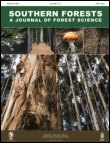
Southern Forests-A Journal of Forest Science
Connecting Scholars to Foster Forest KnowledgeSouthern Forests: A Journal of Forest Science, published by Taylor & Francis Ltd, serves as a vital platform for scholarly discourse in the field of forestry. With a robust ISSN of 2070-2620 and E-ISSN of 2070-2639, this journal highlights cutting-edge research and vital advancements from 2008 to 2024. Based in the United Kingdom, it continues to make significant contributions, evidenced by its current Q3 ranking in the forestry category of Scopus as well as its rank of 94 out of 174 in Agricultural and Biological Sciences. This journal caters to a diverse audience of researchers, professionals, and students, providing access to high-quality articles that promote sustainable forest management and ecological studies. Despite being classified as a non-open access journal, it remains a key resource, ensuring accessibility to crucial information that addresses both local and global forest challenges.

Revista Forestal Mesoamerica Kuru-RFMK
Advancing forest science for a sustainable Mesoamerica.Revista Forestal Mesoamerica Kuru-RFMK is a vital academic platform dedicated to the advancement of forest science and management within the Mesoamerican region. Published by the Instituto Tecnológico de Costa Rica, this journal has been an Open Access resource since 2011, ensuring that critical research is accessible to a global audience. With an ISSN of 2215-2504, it aims to foster collaboration and knowledge exchange among researchers, professionals, and students eager to address the pressing challenges facing forests in Central America. The journal prioritizes interdisciplinary studies related to forest ecology, conservation, and sustainable management practices, making it an indispensable reference for anyone interested in enhancing forest health and biodiversity. By contributing to this resource, scholars can impact policy and practice while enriching the academic community’s understanding of Mesoamerica's unique forest ecosystems.
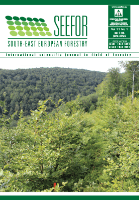
SEEFOR-South-East European Forestry
Exploring the dynamics of forestry in a changing environment.SEEFOR-South-East European Forestry is a premier open-access journal dedicated to advancing knowledge in the field of forestry and environmental science. Published by the CROATIAN FOREST RESEARCH INSTITUTE, this journal has been operational since 2010, providing a platform for research that focuses on the unique forestry dynamics of the South-East European region. With an ISSN of 1847-6481 and an E-ISSN of 1849-0891, SEEFOR is recognized for its commitment to disseminating high-quality research that addresses critical issues in forestry management, conservation, and sustainable development. The journal is indexed in Scopus, placing it within the third quartile (Q3) of forestry journals, reflecting its significance within the academic community. SEEFOR aims to connect researchers, practitioners, and policymakers, fostering collaboration and innovation in fostering sustainable forestry practices in Croatia and beyond. Submissions are welcome in a range of areas including forest ecology, policy development, and socio-economic impacts, making it an invaluable resource for professionals and students alike.

JOURNAL OF TROPICAL FOREST SCIENCE
Innovating Conservation Strategies for Tropical EcosystemsThe JOURNAL OF TROPICAL FOREST SCIENCE, published by the FOREST RESEARCH INST MALAYSIA, serves as a vital platform for disseminating research focused on tropical forestry. Since its inception in 1988 and transitioning to its current form in 1993, this journal has established itself within the academic community, currently holding a commendable Q3 ranking in the Forestry category, as per the 2023 metrics. With an ISSN of 0128-1283 and E-ISSN 2521-9847, it provides crucial insights into the ecological, economic, and social aspects of tropical forest management and conservation, making it an indispensable resource for researchers, practitioners, and students alike. Although it does not operate under an open-access model, the journal emphasizes quality and relevance in its publications, contributing significantly to the ongoing discourse in agricultural and biological sciences with a Scopus rank of #89 out of 174 and a 49th percentile position.

Sumarski List
Illuminating Trends and Practices in Forest ManagementSumarski List, published by the Croatian Forestry Society, serves as a key platform for the dissemination of knowledge and research within the field of forestry. Established in the early 1980s, this journal has maintained a consistent commitment to advancing the understanding of forest management, ecology, and conservation. With an ISSN of 0373-1332 and an E-ISSN of 1846-9140, it provides researchers and practitioners with valuable insights into current trends and practices in forestry, although it currently falls within the Q4 category in the 2023 forestry rankings. The journal is accessible primarily in printed format, promoting rigorous scholarship and discussion. The important contributions of Sumarski List are vital for fostering a greater appreciation of forestry in Croatia and beyond, making it an essential resource for those dedicated to tackling the pressing challenges in forest ecosystems.

NEW FORESTS
Transforming Challenges into Solutions in Forestry.NEW FORESTS, published by SPRINGER, stands at the forefront of forestry research, delivering cutting-edge insights into forest science, management, and conservation. With an ISSN of 0169-4286 and an E-ISSN of 1573-5095, this esteemed journal has earned a distinguished reputation as it continues to contribute significantly to the field since its inception in 1986. As evidenced by its impressive ranking in the Q1 category for Forestry and being positioned at #32/174 in the Scopus Ranks for Agricultural and Biological Sciences, NEW FORESTS maintains an 81st percentile standing, emphasizing its influential role in advancing scientific discourse. The journal focuses on a diverse array of topics within the realm of forestry, making it an essential resource for researchers, professionals, and students eager to engage with contemporary developments and challenges in forest ecosystems. Although it is not an open-access journal, access to its articles can be facilitated through various academic institutions and libraries, ensuring that vital research is available to a broad audience. As we look toward the future, NEW FORESTS continues to strive for excellence, fostering dialogue and collaboration among scholars committed to sustainable forest management and restoration until at least 2024.
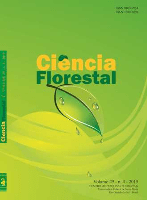
CIENCIA FLORESTAL
Fostering Collaboration in Forestry ResearchCIENCIA FLORESTAL is a premier open-access journal published by the Universidade Federal de Santa Maria, dedicated to advancing knowledge in the field of Forestry. Established in 1991, it provides a vital platform for researchers, professionals, and students to disseminate innovative research findings and methodologies. With an ISSN of 0103-9954 and an E-ISSN of 1980-5098, this journal offers extensive access options for a global audience, ensuring that key scientific discoveries in forest science are available to all. The journal is recognized for its contribution to the scholarly community, currently ranked in the Q3 category within the Forestry discipline, reflecting its commitment to quality and relevance in research. CIENCIA FLORESTAL covers a wide array of topics related to forestry practices, environmental sustainability, and biological sciences, making it an essential resource for those seeking to deepen their understanding of forest ecosystems and their management. Whether you’re a seasoned researcher or a student embarking on your academic journey, CIENCIA FLORESTAL stands as an invaluable asset in the exploration and development of forestry sciences in Brazil and beyond.
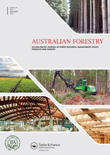
AUSTRALIAN FORESTRY
Pioneering Insights in Forestry and ConservationAustralian Forestry is an esteemed journal dedicated to advancing knowledge in the field of forestry and related environmental science. Published by Taylor & Francis Australia, this journal plays a pivotal role in disseminating high-quality research that spans various aspects of forestry, including sustainable management, conservation practices, and policy analysis. With an impact factor reflecting its significance in the academic community and a Scopus rank of #44 out of 174 in the category of Agricultural and Biological Sciences, Australian Forestry proudly holds a Q2 ranking in its field as of 2023. The journal has maintained a continuous publication record since its inception in 1936, with a commitment to addressing contemporary challenges within forestry. Researchers, professionals, and students alike are invited to engage with this vital resource that fosters insightful dialogue, innovative solutions, and a deeper understanding of forestry science.
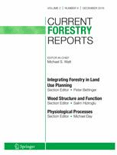
Current Forestry Reports
Advancing sustainable forestry research for a greener tomorrow.Current Forestry Reports, published by Springer International Publishing AG, stands at the forefront of forestry and ecological research, boasting an impressive array of quartile rankings in 2023 such as Q1 in Ecology and Forestry. With an ISSN of 2198-6436, this journal has emerged as a pivotal platform for disseminating innovative research findings and insights critical to the sustainable management of forest ecosystems. Operating out of Switzerland, it covers a broad scope that spans from ecological theory to practical forestry applications and landscape conservation. Notably, it ranks #3 out of 174 in Agricultural and Biological Sciences: Forestry and #4 out of 211 in Environmental Science: Nature and Landscape Conservation, reflecting its high impact and relevance in the field, placing it in the top percentiles in multiple categories. This open-access journal endeavors to provide a comprehensive understanding of contemporary issues, trends, and methodologies in forestry and related disciplines, making it an indispensable resource for researchers, practitioners, and students who are dedicated to advancing knowledge and practices in forest science.

Forest Ecosystems
Connecting research to conservation efforts.Forest Ecosystems is a prestigious open access journal published by KEAI PUBLISHING LTD, dedicated to advancing knowledge in the fields of forestry, ecology, and conservation. Established in 2014 and located in Beijing, China, this journal has rapidly gained prominence, achieving Q1 status in multiple categories, including Ecology, Evolution, Behavior and Systematics, and Forestry in 2023. With an impressive rank of 19 out of 174 in the Scopus category of Agricultural and Biological Sciences - Forestry, it stands in the 89th percentile, reflecting its influential contributions to the field. The journal fosters scholarly discourse and disseminates innovative research aimed at understanding forest ecosystems and their vital role in our environment. Offering a robust platform for researchers, professionals, and students, Forest Ecosystems ensures accessibility through its open access format, enabling a wider audience to engage with and benefit from cutting-edge research dedicated to the stewardship of forest resources.